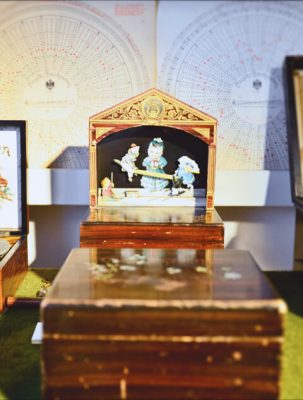The principle is very simple: a steel plate is cut several times so that tongues of different lengths are produced. The comb is screwed to a solid bridge, which transmits the vibrations of the tongues to a wooden soundboard. The tongues are hit by the pins of a brass roller that runs directly past the tines.
In the 1880s, the introduction of the disc music boxes “Plattenspieldosen” was the starting point for the mass consumption of automatic music. Here too, the sound is generated by a metal comb, only the trigger command comes from the pins of the rotating disc. The industrial production of record music boxes was concentrated in Leipzig (Germany) with the local companies Symphonion, Kalliope, Adler and Polyphonen Musikwerke, from which the Deutsche Grammophon-Gesellschaft Berlin-Hannover emerged during the First World War.
The length of the song was determined by the size of the record. In general, one melody is stored on one disk. The size of the sound carriers ranges from 11.5 cm to 68.5 cm Music boxes with discs were used for performances for children or as coin-operated machines in large cupboards, as wall cabinets or as table tops.
ABOUT THE JACOBI COLLECTION
For some time now, interest in these hard-to-find mechanical musical instruments has been growing again. This is mainly due to private collectors who make their holdings available to the public. One of these enthusiasts was the businessman Rolf Jacobi, who together with his wife Heidi Jacobi collected this unique collection over many decades. Beginning with a little polyphony that his mother gave him, he fell in love with these sound marvels.
We are very pleased that we can now offer this unique collection to a wider public, so that these beauties do not fall into oblivion. We thank Heidi Jacobi for the permission to record these devices. Especially Rainer Scharl, who helped us with the production from the beginning. And of course to the rest of the Jacobi team.
HOW YOU CAN USE IT
This impressive collection can be used in many ways. Often you need background music in a scene or as main music in a playful media production. Not to mention holiday greetings. As a sound effect in feature films, authentic sound cannot be used often enough to adapt the scenery to the time. These machines were mainly used in the 18th century. For this reason it can be that sometimes an instrument starts to grind down a little. We have deliberately refrained from elaborate sound processing in order not to destroy this very charm. But that doesn’t mean that we kept the footage in its raw state. Every track was carefully inspected, the volume was adjusted and unavoidable sound improvement with equalizers and compressors were made in a gentle way.
Recorded in 192 kHz with a stereo X/Y and a stereo M/S setup. In addition to this high quality download, each customer also receives a 48 kHZ download for fast use in common projects. Don’t hesitate to ask us for additional sample rates, we are happy to offer other download versions upon request.
All these songs are royalty free and can be used in all your projects without GEMA registration or reporting to other collecting society, like all our other sound effects. Detailed information about the license terms can be found in the End User License Agreement.





























